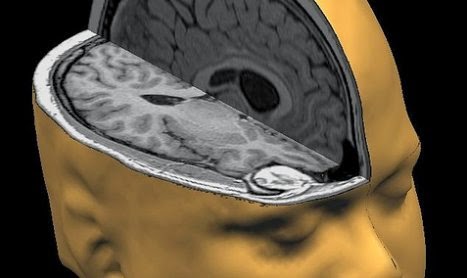You comfort them over a skinned knee in the playground, and coax them to sleep with a soothing lullaby. But being a nurturing mother is not just about emotional care – it pays dividends by determining the size of your child’s brain, scientists say.
Shocking: According to neurologists the sizeable difference between these two brains has one primary cause – the way were treated by their mothers
Both of these images are brain scans of a two three-year-old children, but the brain on the left is considerably larger, has fewer spots and less dark areas, compared to the one on the right.
According to neurologists this sizeable difference has one primary cause – the way each child was treated by their mothers.
But the child with the shrunken brain was the victim of severe neglect and abuse.
Babies’ brains grow and develop as they interact with their environment and learn how to function within it.
When babies’ cries bring food or comfort, they are strengthening the neuronal pathways that help them learn how to get their needs met, both physically and emotionally. But babies who do not get responses to their cries, and babies whose cries are met with abuse, learn different lessons.
The neuronal pathways that are developed and strengthened under negative conditions prepare children to cope in that negative environment, and their ability to respond to nurturing and kindness may be impaired.
According to research reported by the newspaper, the brain on the right in the image above worryingly lacks some of the most fundamental areas present in the image on the left.
The consequences of these deficits are pronounced – the child on the left with the larger brain will be more intelligent and more likely to develop the social ability to empathise with others.

This type of severe, global neglect can have devastating consequences. The extreme lack of stimulation may result in fewer neuronal pathways available for learning.
The lack of opportunity to form an attachment with a nurturing caregiver during infancy may mean that some of these children will always have difficulties forming meaningful relationships with others. But studies have also found that time played a factor–children who were adopted as young infants have shown more recovery than children who were adopted as toddlers.
But in contrast, the child with the shrunken brain will be more likely to become addicted to drugs and involved in violent crimes, much more likely to be unemployed and to be dependent on state benefits.
The child is also more likely to develop mental and other serious health problems.
Some of the specific long-term effects of abuse and neglect on the developing brain can include:
Diminished growth in the left hemisphere, which may increase the risk for depression
Irritability in the limbic system, setting the stage for the emergence of panic disorder and posttraumatic stress disorder
Smaller growth in the hippocampus and limbic abnormalities, which can increase the risk for dissociative disorders and memory impairments
Impairment in the connection between the two brain hemispheres, which has been linked to symptoms of attention-deficit/hyperactivity disorder
Professor Allan Schore, of UCLA, told The Sunday Telegraph that if a baby is not treated properly in the first two years of life, it can have a fundamental impact on development.
He pointed out that the genes for several aspects of brain function, including intelligence, cannot function.
And sadly there is a chance they may never develop and come into existence.
These has concerning implications for neglected children that are taken into care past the age of two.
It also seems that the more severe the mother’s neglect, the more pronounced the damage can be.
The images also have worrying consequences for the childhood neglect cycle – often parents who, because their parents neglected them, do not have fully developed brains, neglect their own children in a similar way.
But research in the U.S. has shown the cycle can be successfully broken if early intervention is staged and families are supported.
The study correlates with research released earlier this year that found that children who are given love and affection from their mothers early in life are smarter with a better ability to learn.
The experiences of infancy and early childhood provide the organizing framework for the expression of children’s intelligence, emotions, and personalities.
When those experiences are primarily negative, children may develop emotional, behavioral, and learning problems that persist throughout their lifetime, especially in the absence of targeted interventions.
The study by child psychiatrists and neuroscientists at Washington University School of Medicine in St. Louis, found school-aged children whose mothers nurtured them early in life have brains with a larger hippocampus, a key structure important to learning, memory and response to stress.
The research was the first to show that changes in this critical region of children’s brain anatomy are linked to a mother’s nurturing, Neurosciencenews.com reports.
The research is published online in the Proceedings of the National Academy of Sciences Early Edition.
Lead author Joan L. Luby, MD, professor of child psychiatry, said the study reinforces how important nurturing parents are to a child’s development.
Image Credit
Sources: Prevent Disease, Childwelfare via Truth Theory
Related:
- Research Mapping Human Emotions Shows Strong Mind Body Connection
- What Self-Love Means: 20+ Ways to be Good to Yourself
- The Effect Of Positive Emotions On Our Health
- 8 crazy symptoms of being in love
- This Hilarious Short Animated Film Shows Exactly What Happens In Your Mind When You Meet Your Crush
- 5 Signs You’re in a Toxic or Draining Relationship
- 9 Good Signs That You’re In The Right Relationship
- When You’re In A Good Relationship, You Learn These 10 Things
- 10 Toxic Relationships Mentally Strong People Avoid
- 10 Signs You Have Found Your Soulmate
- The Four Types Of Friends According To The Buddha
- 5 Things Everyone Should Know About Introverts
- 6 Signs You Could Be a Highly Sensitive Person
- 6 Signs You Are Actually Maturing, Not Just Aging
- 7 Ways to Better Listen to Your Intuition
- 8 Ways To Tell if You’re A Truly Compassionate Person
- 9 Reasons You Need To Be Giving and Receiving Hugs Everyday
- 11 Ways to Live a Happier Life, According to a Psychologist (Hint: These have nothing to do with money!)
- 15 Tips For Empaths And Highly Sensitive People
- 15 Things to Stop Doing to Yourself
- 21 Habits of Happy People
- 102 Habits for Positive Living
















No mention of fathers here - only mothers. It's almost as if they believe that only the mother's care (or lack thereof) is important.
Delete